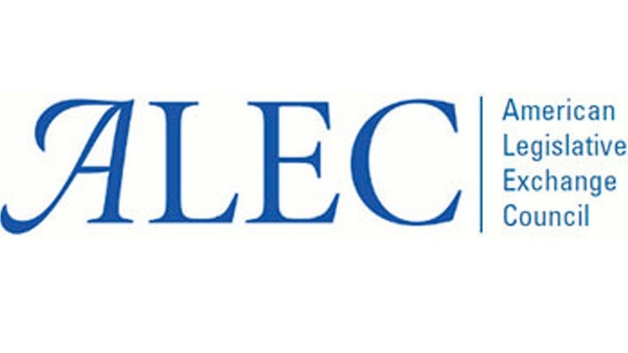In a test of where fossil fuel companies and electric utilities stand on climate denial in the Trump Era, some of the largest energy companies and trade associations in the country will vote this week on a model resolution that calls upon the Environmental Protection Agency to reopen and review the 2009 endangerment finding, which determined that carbon dioxide in the atmosphere threatens public health and welfare of current and future generations.
The vote will take place at the American Legislative Exchange Council (ALEC)’s Energy, Environment, and Agriculture Task Force on December 7, when the companies, trade associations and state legislators meet in Nashville at the Omni Hotel.
The resolution is one of the first steps climate deniers will use in an effort to repeal environmental regulations aimed at reducing carbon dioxide emissions with Scott Pruitt as administrator of the EPA, as outlined in the ALEC model resolution: “WHEREAS, so long as the endangerment finding remains in place, efforts to roll back unnecessary environmental regulations adopted in the name of fighting global warming will likely fail.”
The resolution will be debated at the task force meeting and will likely receive a vote, but not just from the public officials in the room. Lobbyists from Koch Industries, ExxonMobil, Dominion Energy, Duke Energy, and the Edison Electric Institute (EEI) are expected to all be present, as they are dues-paying members, and will cast a vote as equals with the state legislators.
It might be expected that the utility representatives in the room will vote against the resolution; the industry has largely stopped publicly denying human’s role in causing global warming, with the exception of the recent remarks from Southern Company and EEI’s former Chairman Tom Fanning. But the public will still be left in the dark, as these meetings happen behind closed doors.
The Energy and Policy Institute asked EEI, Dominion, Duke, and other known utility companies that have contributed to ALEC in recent years, including Arizona Public Service Company, AES Corporation, Luminant, NIPSCO, and the Salt River Project (SRP) about how they will vote on the model resolution.
A spokesperson for SRP said the resolution could be problematic for the utility industry, though did not dismiss it entirely:
“While we have concerns that in its present form the proposed policy may create uncertainty in the utility industry and is not a constructive effort, it is possible that the task force discussion could result in changes that mitigate our concerns with the measure.”
Asked to clarify whether SRP was more concerned about legal issues if the endangerment finding is attacked, or with ALEC questioning climate science, a spokesperson responded: “We are more focused right now on the legal uncertainty.”
Update: EEI – along with the trade association for rural electric cooperatives NRECA, and Chevron Honeywell International, and UPS – released a letter on Dec. 6, the afternoon before the vote, stating their opposition to the resolution, according to E&E News. The letter said that reexamining the endangerment finding would “would detract from other priorities EPA must address.”
“Even if the Endangerment Findings are overturned, industry would be broadly exposed to tort and nuisance suits brought by citizens and states — as we were prior to EPA regulation of GHGs,” the letter says. “Attempting to rescind the Endangerment Findings would be a return to this untenable state of affairs.”
Despite the obvious opportunity for EEI to express its support for the climate science underpinning the endangerment finding, the letter did not address it.
Todd Wynn previously represented EEI at ALEC conferences, but has since left the trade group to work at the Department of Interior. One possibility for his replacement is EEI’s Director of External Affairs Kristine Telford.
Telford started working for EEI earlier this year but has prior knowledge of the workings of ALEC because she was a member of ALEC’s Telecommunications & Information Technology Task Force while working for DCI Group, a lobbying and communications firm that received $1.6 million from Verizon for lobbying while Telford was there (2010-2013). Also on Telford’s resume are roles at Burson-Marsteller where she worked on the “grassroots” practice for Ford Motor Company and The Herald Group.
However, the more notable experience Telford brings to ALEC that is more relevant to the endangerment finding up for discussion is her prior position at the Heartland Institute. In fact, E&E News reported that the Heartland Institute is rumored to be driving the resolution.
From 2009 through 2010, Telford held the organization’s External and Corporate Affairs position. Heartland is a Chicago-based free-market think tank and 501(c)(3) charity that has been at the forefront of denying the scientific evidence for man-made climate change.
Telford’s time at the Heartland overlapped with the EPA’s endangerment process. Unsurprisingly, Heartland’s public comments to the EPA included statements such as:
“EPA’s contentions that the global warming of the twentieth century was caused by human activity and that human emissions will cause future warming are undermined by an extensive body of scientific research pointing to natural forcings and feedback effects that are not taken into account by computer models. Some of these forcings and effects are sufficiently large to entirely explain the warming of the twentieth century or to entirely offset any human effect due to CO2 emissions …
EPA’s Dismissal of Solar Activity as the Primary Driver of Warming/Cooling Cycles Is Unwarranted and Unwise… it is the sun’s influence that is responsible for most climate change during the past century and beyond.”
This is not the first time ALEC has had a climate denial model resolution brought up for a vote. In August 2014, Heartland’s CEO Joe Bast told ALEC attendees, “there is no scientific consensus on the human role in climate change.”
